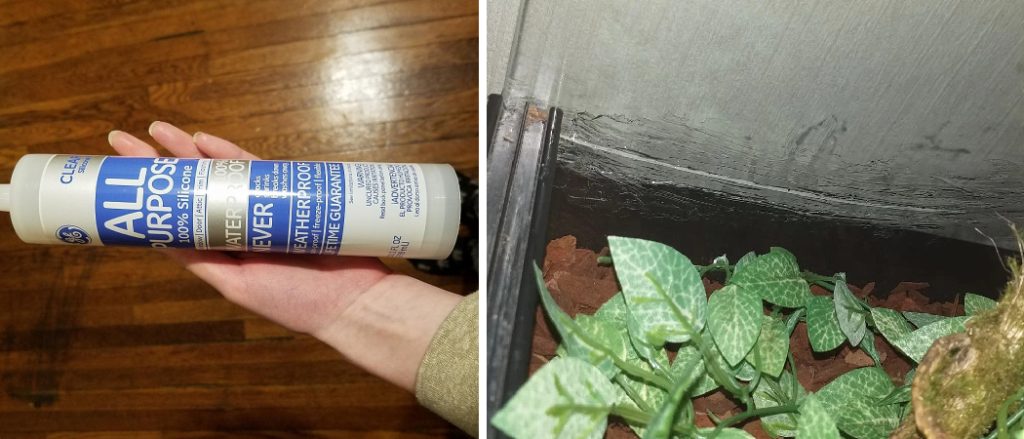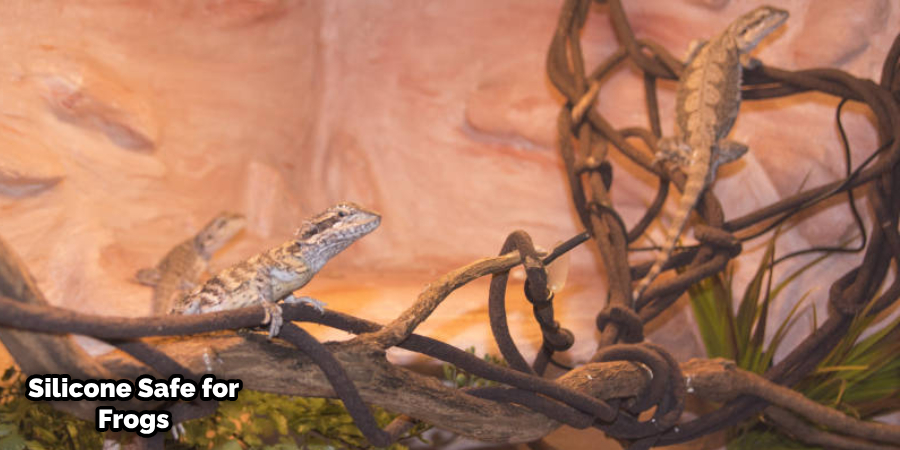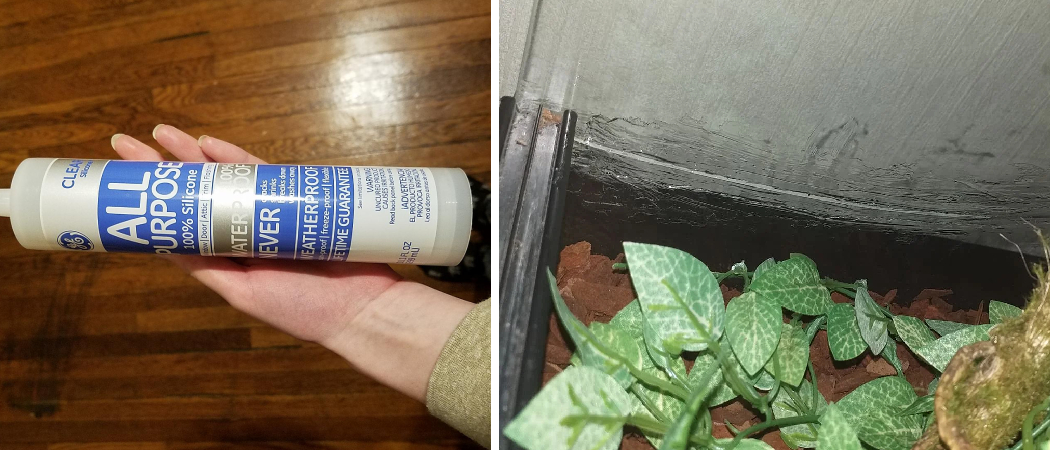Silicone is a synthetic polymer, meaning it is made from man-made materials and not naturally occurring. Silicone products are often found in aquariums and terrariums due to their durability and waterproof properties. When using silicone for reptiles, it is important to make sure that the product is labeled as “food grade” or “aquarium safe,” as this will ensure there are no chemicals or other toxins present which could harm animals. Reptile enthusiasts understand the importance of creating a safe and comfortable habitat for their scaly companions. Whether you’re setting up a new enclosure, making custom modifications, or repairing existing structures, one crucial factor to consider is the type of silicone you use. Not all silicone products are safe for reptiles, and choosing the wrong one can have detrimental effects on your pet’s health. In this comprehensive guide, we will explore the various aspects of silicone safety for reptiles and provide you with the knowledge you need to make informed decisions.
Additionally, it should be ensured that the product does not have any plasticizers added, which may leach out into the water over time. It is also important to note that some sealants contain fungicides which can be dangerous for reptiles; always check labels carefully before use. Finally, when applying silicone caulk around an enclosure, make sure all surfaces are clean beforehand so no dust particles get trapped inside the sealant.

When it comes to caring for reptiles, safety should always be a top priority. Fortunately, there are many materials that can be used safely in reptile enclosures, including silicone. Silicone is a great choice for your enclosure because it is non-toxic and won’t leach any dangerous chemicals into the environment.
Additionally, silicone is waterproof and durable – perfect for creating hiding spots and other features that can help keep your pet comfortable. If you went to know more about what silicone is safe for reptiles, keep reading!
Is GE Silicone #1 Or GE Silicone #2 Safe For Aquarium Use?
What Silicone is Terrarium Safe?
Silicone terrariums are becoming increasingly popular due to their non-toxic and safe nature. Silicones that are considered terrarium safe are those that contain no volatile organic compounds (VOCs), have a low chemical reactivity, and have a high-temperature resistance. Commonly used silicones in terrariums include polydimethylsiloxane, methyl phenyl silicone, and hydroxy silicone.
These materials can be used to seal the edges of glass enclosures or as adhesives for decorative accents within the enclosure. It is important to check with your local pet store or online retailer when selecting silicone products for use within a terrarium environment, as some common household adhesives may not be suitable for this type of application.
The Role of Silicone in Reptile Enclosures
Silicone plays a vital role in reptile husbandry. It is commonly used to seal and bond various components of enclosures, including glass, acrylic, and plastic. Properly applied silicone ensures that your reptile’s environment remains secure, preventing escapes and maintaining the desired temperature and humidity levels. It also helps create a visually appealing enclosure, making it an essential tool for crafting realistic and aesthetically pleasing reptile habitats.
However, not all silicone products are suitable for use in reptile enclosures. Some contain harmful chemicals or additives that can leach into the environment and pose serious health risks to your reptilian companions. Therefore, it is crucial to select silicone sealants and adhesives that are reptile-safe.
Is Silicone Safe for Reptile Enclosures?
Silicone is indeed safe for use in reptile enclosures. It’s an excellent choice for sealing the seams of glass terrariums since it won’t release any toxic fumes into the environment, and it doesn’t break down over time as some other sealants may. Silicone is also non-toxic, so you can be sure that your reptile isn’t being exposed to anything hazardous when living in their enclosure.
Additionally, silicone has strong adhesive qualities and will last a long time without needing replacement or repair.
Is Silicone 1 Safe for Reptiles?
Yes, silicone 1 is safe for reptiles. Silicone 1 is a type of polymer that has been widely used in various industries, including medical, automotive, and food safety, since the 1950s. It is composed of silicon, oxygen, and other elements such as carbon or hydrogen, and it is non-toxic and inert, which makes it ideal for use with reptiles.
Additionally, this material does not absorb moisture or oils, which can be potentially harmful to your reptile pet’s skin when used in enclosures or habitats. Silicone 1 also provides excellent insulation from heat transfer which helps keep the enclosure temperature stable for your pet’s health. All these factors make Silicone 1 an ideal choice for reptile owners who are looking to create a safe environment for their pets.
What Sealant is Safe for Reptile Enclosures?
When selecting a sealant for use in reptile enclosures, it’s important to choose one that won’t be detrimental to your reptile’s health. The best sealants are those made from natural materials such as silicone or latex-based products. Silicone is widely used in aquarium tank construction and has been proven safe for aquatic life; therefore, it can also be safely used around reptiles (though make sure to double-check with the manufacturer).
Latex-based products typically contain fewer volatile organic compounds than other types of sealants, making them safer options as well. It is always recommended to read product labels carefully before purchasing and applying any type of sealant in order to ensure safety when working with reptiles.

Credit: www.reddit.com
Silicone to Avoid for Reptiles
To ensure the safety of your reptiles, avoid the following types of silicone:
1. Construction Silicone:
Silicone sealants labeled for general construction or household use often contain additives and chemicals that can be harmful to reptiles. These products are not suitable for use in reptile enclosures.
2. Silicone with Mold Inhibitors:
Silicone sealants that contain mold inhibitors or fungicides should be avoided. These additives are toxic to reptiles and can negatively affect their health.
3. Colored Silicone:
Avoid colored silicone sealants, as the pigments used to color them may contain harmful chemicals. Opt for clear silicone to ensure the safety of your reptiles.
4. High-VOC Silicone:
Silicone sealants with a high VOC (volatile organic compounds) content can release harmful fumes during curing. These fumes can be toxic to reptiles, so choose low-VOC or VOC-free silicone products.
Is 100% Silicone Safe for Reptiles
100% silicone is safe to use for reptiles, as it does not contain any chemicals or toxins that can be harmful. Silicone also has high heat resistance, making it ideal for heating lamps and other reptile habitats. It also provides an easy-to-clean surface that resists bacteria and dirt build-up.
In addition, silicone is waterproof and will not absorb odors or moisture from the environment.
Is Ge Silicone 1 Safe for Reptiles?
Yes, GE Silicone 1 is safe for reptiles. Reptiles are sensitive to strong odors and chemicals, which can be harmful to them if they come into contact with it. However, GE Silicone 1 is made of 100% silicone and has no toxic additives or VOCs that could potentially harm your reptile pet.
In addition, this type of sealant provides a waterproof seal that will help keep the enclosure dry and free from mold growth.
Reptile Safe Silicone Home Depot
Reptile-safe silicone from Home Depot is a great option for reptile owners looking to create custom enclosures and accessories for their pets. It’s odorless, non-toxic, and 100% waterproof, making it an ideal material for use in areas with high humidity or frequent contact with water. In addition, it has excellent adhesion properties that make it easy to apply and shape into any desired form.
Sealant Safe for Reptiles
Sealant is not usually considered to be safe for reptiles, as most are made from chemicals that can be harmful when ingested or inhaled. Instead of using sealant, using more natural methods like sphagnum moss or calcium carbonate powder is recommended to keep your reptile enclosure secure and prevent escape.
Silicone Safe for Frogs
Silicone is a safe and non-toxic material for frogs to inhabit. It is often used in tanks, decorations, and other habitats because it is waterproof and won’t break down over time as some plastics can. Silicone does not leach harmful chemicals into the water or air, which makes it ideal for housing amphibians.
Additionally, silicone is easy to clean with just warm water and mild detergent, making it ideal for long-term use.

Reptile Safe Waterproof Wood Sealant
Reptile-safe waterproof wood sealant is a great way to protect your reptile’s habitat from damage or decay caused by water and humidity. It is specially formulated with natural ingredients that are non-toxic, odorless, and have no fumes. The sealant also helps to keep out potential pests such as ants, roaches, and other crawling insects while providing an extra layer of protection against moisture.
With its easy application process, you can quickly create a safe space for your pet without worrying about hazardous chemicals in the air or on their skin.
Application Tips for Reptile-Safe Silicone
Once you’ve selected a reptile-safe silicone product, it’s essential to apply it correctly to ensure a safe and effective seal. Here are some application tips:
1. Prepare the Surface:
Before applying silicone, clean and prepare the surface by removing any dirt, dust, or old silicone residues. Proper surface preparation is essential for adhesion.
2. Use a Caulking Gun:
For precise application, use a caulking gun to dispense the silicone. This allows for better control and a more even bead of silicone.
3. Apply in a Well-Ventilated Area:
Work in a well-ventilated area or outdoors when possible. This helps dissipate any fumes produced during the curing process.
4. Allow for Adequate Curing Time:
Silicone sealants typically cure within 24 hours, but the exact curing time may vary depending on temperature and humidity. Follow the manufacturer’s instructions for the recommended curing time before introducing your reptile to the enclosure.
5. Check for Leaks:
After applying silicone, check for leaks or gaps in the enclosure’s seams and corners. Ensure that the silicone has formed a complete seal to prevent escapes and maintain proper environmental conditions.
Vivarium Safe Silicone Black
Vivarium Safe Silicone Black is a specially formulated silicone sealant that has been designed for use in vivariums and other reptile enclosures. It provides an airtight seal against water damage, prevents the growth of mildew and bacteria, and is non-toxic to animals living in the enclosure. The product can be used around electrical fixtures, and it dries quickly without leaving any residue or odor behind.
It’s perfect for creating safe, secure habitats for your reptiles while also protecting them from potential hazards.
Ha6 Silicone
Ha6 Silicone is a type of silicone rubber that has been developed by Dow Corning for use in medical, automotive, and industrial applications. This material features improved flexibility and strength compared to traditional silicones while also offering excellent resistance to extreme temperatures, UV light, and chemicals. Ha6 Silicone can be used to create seals, gaskets, vibration-dampening materials, shock absorbers, and more due to its unique combination of properties.
Conclusion
In conclusion, it is important to be aware of the types of silicone products that are safe for reptiles. Silicone can provide a beneficial substrate or enclosure decoration for reptile enclosures and also has many uses in other areas, such as crafts, toys, and tools. When selecting any type of silicone product, always look for non-toxic varieties with no added chemicals or dyes to ensure you are providing your reptile with a safe environment. Thank you for reading our post about what silicone is safe for reptiles.

